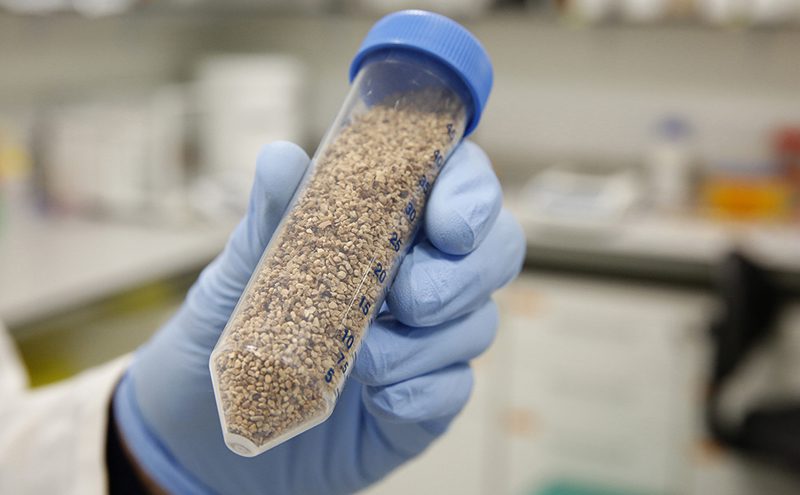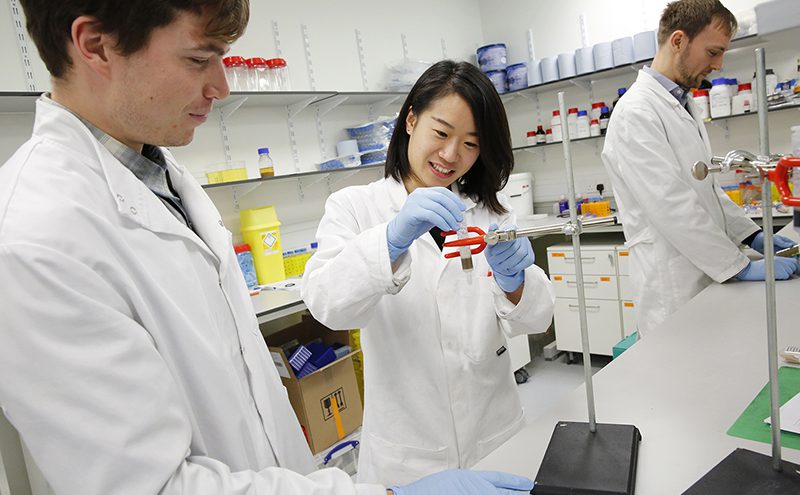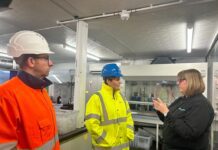
Biomaterials start-up CustoMem has received a €1.4m (£1.24m) grant and says the award will allow it to bring to market its next generation granular media, optimised to capture and recycle specific challenging micropollutants found in industrial wastewater.
The firm was founded in 2015 by two Imperial College London graduates, Henrik Hagemann and Gabi Santosa.
“This is a game-changing grant for us,” explained CustoMem CEO Henrik Hagemann. “Our products’ superior performance and cost-effectiveness have been validated in our laboratory and initial trials with clients. This grant enables us to scale up to industrial pilot trials of greater than 100 m3/day flow rates.”
“With under 3 percent of all applicants securing a grant, our success demonstrates confidence in our company, our product and the quality of CustoMem’s team. As part of the award, we will continue to receive mentoring from world renowned experts and critical business acceleration services including linking us to potential customers and investors.”
The award to CustoMem is funded through the Horizon 2020 SME Instrument, part of the European Innovation Council, supporting top class innovators and entrepreneurs. Horizon 2020 offers funding and additional support for breakthrough ideas with the potential to create new markets or revolutionise existing ones.

The material and where it might be used
CustoMem, based at the Imperial College Innovation Hub in London, has combined its leading expertise in biomaterials and synthetic biology to create CGM (CustoMem Granular Media). This novel bio-adsorbent can selectively capture micropollutants, like Perfluorinated Compounds (PFCs) from wastewater in standard steel tank processing equipment that provides significant cost savings to customers compared with traditional adsorbent materials like anion-exchange media and granular activated carbon.
Captured waste is disposed of safely as CGM can be chemically regenerated using a non-hazardous proprietary wash whereby the capture pollutants are removed and safely disposed of or repurposed. Crucially, CGM’s optimised performance allows faster flowrates and saves floorspace, utilising up to four times less plant footprint than activated carbon solutions.
CGM is being targeted for use at commercial airports, petrochemical plants and is particularly relevant to navy and air force bases where Aqueous Film Forming Foams (AFFFs) for firefighting are indispensable for safety reasons. However, these AFFFs contain PFCs that are carcinogenic and persistent in the environment. The CGM product can treat these industries’ industrial wastewater and help restore legacy contamination sites, thus preventing leaching into drinking water and agricultural land.
As part of CustoMem’s plans for accelerated commercialisation, CustoMem receives mentorship from a number of specialists in its field including Dr Rita Glenne, chief technology officer, Reactive Metal Particles AS; Dr Steve Gluck, former technology Fellow at Dow Water and Process Solutions and current scientific advisor to a number of water and wastewater companies; Dr Steve Colley, former Director of Johnson Matthey Water Technologies; and Dr Tali Harif, Innovation portfolio manager at Severn Trent Water and previously head of the water treatment business unit at water and environmental consultants WRC.
Dr Gluck has just spent eight months working with CustoMem, he said. “I am hugely impressed with the strength and the commitment which exists within this young company. CustoMem is now crystalizing its strategy and media performance for scale-up deployments.”
“We are already undertaking initial testing with a number of companies and organisations including two commercial European airports,” said CustoMem’s Henrik Hagemann. “Following this EC grant we are now ready to upscale and are actively welcoming partners to trial our solution on-site.”
Micro-pollutants primer
Industrial micro-pollutants comprise only a small percentage of total pollutants but their complex chemistries prevent them from being effectively dealt with by current wastewater treatment methods. This renders freshwater unusable and contributes to water stress that will affect 47 per cent of the world’s population by 2030.
One such class of micropollutants includes Perfluorinated Compounds (PFCs), which pose a substantial health problem as they are highly toxic to humans and animals.
PFCs are a class of compounds common in Aqueous Film Forming Foams (AFFFs) used for firefighting and can also be found in fluoropolymer coated cookware, sports clothing, food packaging, medical equipment, oil additives, paint and inks. They are amongst the most stable organic compounds and are highly persistent in the environment.
The health threat posed by PFCs has prompted many countries to lay down more stringent regulations to the discharge of these compounds, and even banning them completely in some cases. This is evidenced by recent moves by both the EU via the Environmental Quality Standards Directive and in the US via the Environmental Protection Agency.
CustoMem says it tackles this problem by manufacturing CGM, a material optimised to capture challenging micropollutants from waste water. CGM is designed to drop-in to existing packed-bed infrastructure used in current activated carbon water treatment systems. This avoids the need to install expensive treatment processes and will augment water recycling and reclamation on local and industrial scales.
CGM is designed and manufactured through a sustainable biological production that does not rely on or produce any hazardous chemicals and reduces energy consumption, says the firm. It enables a circular economy and reduces energy of operation upon implementation.
CustoMem has been supported by various institutions for engineering commercialisation and sustainability including the Royal Academy of Engineering, SynbiCITE, Climate KIC and Armourers & Brasiers livery company.







